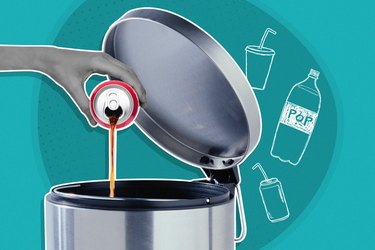
Grocery shelves are packed with processed foods. And while there's nothing quite like the satisfying crunch of a chip, you're probably no stranger to the fact that processed foods can have some negative effects on your health. But what are the effects of processed food, exactly?
Fifty percent of a typical American's diet is made up of ultra-processed food, according to the American Heart Association (AHA). Here's what processed food is and what it can do to your health.
Video of the Day
Video of the Day
What Is Processed Food?
Processed snacks are much more than just packaged cereals or fast food.
Technically, "processed foods" are foods that have been cooked, frozen, packaged or changed in nutritional composition, according to the Academy of Nutrition and Dietetics.
But what exactly counts as a processed food — for instance, are chips processed food? Here's the breakdown, ranging from minimally to more heavily processed goods:
- Minimally processed foods: Foods that have been packaged or preserved at peak freshness, such as canned tomatoes, pre-cut veggies, frozen fruit or can tuna are processed foods that fall into this category.
- Heavily or ultra-processed foods: Ready-to-eat foods are on the more heavily processed side. The list of ultra-processed foods includes things like crackers, granola and deli meat. The most heavily processed foods are usually pre-made meals like frozen TV dinners.
Processed foods are often blamed for being the cause of diet downfalls — but not all of them deserve the bad reputation they're given.
"To understand what an ultra-processed food is, first you need to know what an unprocessed food is," says Frances Largeman-Roth, RDN, nutrition expert and author of the upcoming book Everyday Snack Tray.
"Unprocessed foods are foods in their original (or close-to-original form), including raw fruits and vegetables, unsalted nuts and seeds, and raw meat, seafood and poultry. As you can see, it's a pretty small list. Most foods go through some type of processing to make them safe and/or palatable to eat."
And in some cases, processing can actually provide added vitamins and nutrients due to fortification. Fortification is when certain nutrients are added to the food in order to improve nutrient density. For instance, milk is fortified with vitamin D (which is not naturally present in milk), a nutrient most of us don't get enough of.
Pasteurization is another form of food processing that benefits your health. This process applies heat to food (often dairy) in order to destroy any potentially harmful bacteria, per the International Dairy Foods Association. Without this form of food processing, many dairy products could be risky to eat.
Alongside some of these health benefits, processed or packaged foods can also be more convenient for anyone with a busy lifestyle, says dietitian Sarah Schlichter, RD.
"Not everyone has the time, energy or availability to cook from scratch every night," she says.
"For example, I'd encourage a busy mom preparing dinner for her family of six to buy pre-cut or frozen vegetables, a rotisserie chicken and bread to feed everyone — and that can make for a completely healthy and balanced meal. Processed foods can fill the gaps while still providing nutrients — and sanity."
But, of course, the more heavily processed foods — like processed chips or baked goods — can be detrimental to your health if you're eating them too much or too frequently.
Many times, heavy processing can take away from the food's natural vitamins and minerals (think: peeling the skin off fruit and veggies as well as processing whole grains to make white bread or refined-grain products), according to the Harvard T.H. Chan School of Public Health.
The Effects of Processed Foods
As mentioned before, not all processed foods negatively effect your health. However, eating highly processed goods too frequently can cause harm. Here's why processed food is potentially bad for your health:
1. Your Weight Might Go Up
Processed foods have been linked to overeating and weight gain because they can be dense in calories.
People following a highly processed diet tend to eat around 500 more calories than participants following a minimally processed regimen, according to a small July 2019 study in Cell Metabolism. As a result, people following the highly processed meal plans gained more weight on average and ate faster, too.
Eating too quickly can make it difficult to identify satiety cues, causing overeating in some cases, according to Harvard Health Publishing.
What's more, eating more ultra-processed food is associated with a higher risk for obesity, according to a December 2017 review in Current Obesity Reports. Per a November 2019 study in Current Treatment Options in Gastroenterology, the following snacks contribute to weight gain the most:
- Potato chips
- Sugary drinks like soda
- Sweets and desserts
- Refined grains like white bread and white rice
- Processed meats
It is unclear if the high risk for obesity is due to the processing of the food, which strips it from important nutrients, or because processed foods often pack in more ingredients such as sugar, which tacks on more calories.
What's more, a November 2022 study in Addiction has linked certain ultra-processed foods — like chips, French fries and cookies — to compulsive eating behaviors where people are unable to cut down on how much food they're eating, Largeman-Roth says.
"These foods can change the way we feel and cause changes in the brain that are as intense as the nicotine in tobacco products. Additionally, they can trigger intense cravings," she tells LIVESTRONG.com.
That said, this is only one study — food addiction is not a medical diagnosis, so not all experts agree that food can be addictive, Largeman-Roth says.
List of Processed Meats to Avoid
According to the Cleveland Clinic, here are some processed meats that are best to limit or avoid, as they're linked to increased risk for health problems:
- Deli meats like salami and bologna
- Bacon
- Sausage
- Hot dogs
2. You Might Be at Higher Risk for Diabetes
Type 2 diabetes is a complex condition with a variety of risk factors, including things like age and genetics. But dietary habits are among the reversible factors, according to an April 2017 review in the International Journal of Health Sciences. The review found that diets high in fried foods and sweets can up the risk of insulin resistance and type 2 diabetes.
What's more, a December 2019 study in JAMA Internal Medicine found that a larger proportion of ultra-processed foods in the diet was associated with a higher risk of developing type 2 diabetes.
After observing more than 100,000 people, researchers concluded that processed foods can increase the risk of type 2 diabetes even after taking lifestyle and sociodemographic factors into account.
3. You Might Have Increased Risk for Cancer
Although there's no one ingredient or ultra-processed food that has been shown to directly cause cancer, a highly processed diet has been linked to an overall increased risk of death, according to a May 2019 study in the BMJ, which analyzed the diets of almost 20,000 people over five years.
In this study, the main cause of death was cancer and the risk of death by all causes was observed to be 62 percent greater for those with the highest amount (more than four servings per day) of ultra-processed foods.
What's worse is the risk of death by all causes was observed to increase by 18 percent with just one additional serving of processed food per day.
More specifically, processed meats have been linked to an increased risk of colorectal cancer, prompting the International Agency of Cancer Research to classify them as a carcinogen, per the American Cancer Society (ACS).
In fact, data collected from more than 800 studies observed that eating 50 grams of processed meat every day increased the risk of colorectal cancer by 18 percent, according to the ACS. That may seem like a lot of meat, but 50 grams equals to about four strips of bacon or just one hot dog.
4. Your Heart May Suffer
Another May 2019 study in the BMJ looked at over 100,000 people and found that eating ultra-processed foods was associated with an increased risk of heart disease.
Some of the types of foods they found associations with were ultra-processed fats and sauces, meats, sugary products, processed beverages and salty snacks.
Using data of more than 13,000 adults, researchers observed an overall decrease in heart health for every 5 percent increase in calories from ultra-processed foods, according to research presented in November 2019 by the Centers for Disease Control and Prevention.
High sodium levels are related to high blood pressure, a risk factor for heart disease and stroke, according to the AHA. Given that a majority of Americans' sodium comes from processed foods, choosing reduced-sodium options, for instance, is a measure you can take to minimize the negative effects of processed foods.
Tip
Look for the AHA's Heart-Check mark on packaged foods. The AHA's Heart-Check Food Certification Program is created to help inform consumers on which processed foods are lower in saturated fat, cholesterol and sodium. Foods with the checkmark also provide at least 10 percent of the Daily Value of either vitamin A, vitamin C, iron, calcium, protein or fiber.
5. You Might Be at Higher Risk for a Stroke
A July 2015 paper in Stroke suggests that there is an association between processed foods — specifically processed meats — and an increased risk of stroke. A diet high in processed foods is one that is often also high in sodium, which has been linked to higher risk for a stroke.
And when you're filling up on processed foods, there isn't much room for fresh fruits and vegetables, which are high in potassium. This combination could spell disaster, says Lindsey Pfau, RD, owner of Rise Up Nutrition, explaining that sodium and potassium control blood pressure. "Sodium can increase your blood pressure while potassium can decrease it."
When your blood pressure is elevated, blood flow through the arteries is restricted. Once blood flow to the brain is blocked, it can cause a stroke. What's more, Pfau says, high cholesterol levels could lead to blood clots, which can also block blood flow to the brain.
Plus, processed foods may also be high in trans fats — such as partially hydrogenated oils — which could contribute to high cholesterol, heart attack and stroke risk, Pfau warns.
6. Your Gut May Change for the Worse
A healthy gut is one that has a diverse number of bacteria — in type and in number.
Your diet has the potential to change the composition of the bacteria in the gut. In fact, diets rich in fiber can promote the growth of healthy gut bacteria and reduce inflammation in the gut, according to an August 2019 review in Microorganisms.
Fermented foods, such as yogurt and sauerkraut, have also been shown to promote a healthy gut.
In addition, researchers may be getting closer to an answer on whether or not artificial sweeteners are good or bad for your gut health. According to an October 2019 review in Nutrients, artificial sweeteners negatively altered gut bacteria in people who did not normally eat them.
Researchers also found a link between artificial sweeteners and glucose intolerance.
7. Your Brain Health Could Be Compromised
A cohort study of nearly 500,000 people discovered that eating processed meats is linked to a higher dementia risk, per the March 2021 study in The American Journal of Clinical Nutrition.
What's more, processed foods are often rife with refined sugar, which promotes inflammation and oxidative stress. And there's plenty of evidence that links a diet high in refined sugars to reduced brain function and worsening mood disorders, such as depression, according to Harvard Health Publishing.
8. Your Longevity Might Decline
A February 2019 study in JAMA Internal Medicine looked at over 44,000 middle-aged people in France and found that over a seven-year follow-up period, an increase in processed foods consumption was linked to a higher risk of death.
What's more, a May 2019 study in BMJ found that chomping on more than four servings of processed foods per day was associated with a 62 percent increased risk of dying from non-age-related causes. The researchers took it a step further and observed that for every additional serving of processed food, those chances increased by 18 percent.
"We have to remember the word 'risk,'" Pfau says. "No single food is going to cause stroke [or death] or even increase the risk for it. It's about the entire diet and lifestyle."
Heather Caplan, RD, agrees: "We need to zoom out and see the full scope. I don't focus on a single food; there are so many other dietary factors to consider."
Alternatives to Heavily Processed Foods32
Here are Largeman-Roth's recommendations for nutritious snacks to try in lieu of more unhealthy processed foods:
- Aged cheese
- Unsweetened (or minimally sweetened) yogurt
- Whole-grain crackers and cereal
- Dried fruit
- Popcorn
- Trail mix
- Frozen fruits and veggies
- Add in spices, fresh herbs and citrus zest to foods instead of high-sodium seasonings
The Bottom Line on Processed Foods
An increase in highly processed food in the diet typically means that the diet has lower amounts of fruits and vegetables, which are main sources of antioxidants and fiber — and are essential for good health.
But cutting out processed foods entirely isn't necessarily the answer. Instead, do your best to prioritize minimally processed foods over the ultra-processed fare, which should be eaten in moderation.
"We don't need to eliminate all processed foods from our diets, as there is a spectrum of processing involved," Schlichter tells LIVESTRONG.com.
If they occupy a large part of your diet, the dangers of processed foods can include long-lasting negative effects on your health. But if you eat them wisely, prioritizing more minimally processed options with the occasional ultra-processed indulgence, these foods can be a part of a balanced, nutritious lifestyle.
Additional reporting by Bojana Galic.
- Academy of Nutrition and Dietetics: "Processed Foods: What's OK and What to Avoid"
- International Dairy Foods Association: "Pasteurization"
- Harvard T.H. Chan School of Public Health: "Processed Foods and Health"
- Cell Metabolism: "Ultra-Processed Diets Cause Excess Calorie Intake and Weight Gain: An Inpatient Randomized Controlled Trial of Ad Libitum Food Intake."
- Harvard Health Publishing: "Why Eating Slowly May Help you Feel Full Faster"
- British Medical Journal: "Ultra-processed Food Intake and Risk of Cardiovascular Disease: Prospective Cohort Study (NutriNet-Santé)"
- American Heart Association: "Too Much Ultra-Processed Foods Linked to Lower Heart Health"
- American Heart Association: "Heart-Check Food Certification Program Nutrition Requirements"
- BMJ: Association between consumption of ultra-processed foods and all cause mortality: SUN prospective cohort study
- Current Obesity Reports: "Ultra-processed Food Intake and Obesity: What Really Matters for Health – Processing or Nutrient Content?"
- Harvard Medical School: "Gut Feelings: How Food Affects Your Mood"
- Microorganisms: "The Role of Gut Microbiota in Intestinal Inflammation with Respect to Diet and Extrinsic Stressors"
- Nutrients: "Food Components and Dietary Habits: Keys for a Healthy Gut Microbiota Composition"
- The American Journal of Clinical Nutrition: "Meat consumption and risk of incident dementia: cohort study of 493,888 UK Biobank participants"
- Harvard Health Publishing: "Nutritional psychiatry: Your brain on food"
- Cleveland Clinic: "Benefits of eating fresh versus processed meats"
- Current Treatment Options in Gastroenterology: "Beyond the Calories—Is the Problem in the Processing?"
- American Cancer Society: "What’s Wrong with Hot Dogs, Hamburgers, and Bacon?"
- Stroke: "Diet and stroke: recent evidence supporting a Mediterranean style diet and food in the primary prevention of stroke"
- International Journal of Health Sciences: "Effect of diet on type 2 diabetes mellitus: A review"
- JAMA Internal Medicine: "Ultraprocessed Food Consumption and Risk of Type 2 Diabetes Among Participants of the NutriNet-Santé Prospective Cohort"
- JAMA Internal Medicine: "Association Between Ultraprocessed Food Consumption and Risk of Mortality Among Middle-aged Adults in France"
- Addiction: "Highly processed foods can be considered addictive substances based on established scientific criteria"
- American Heart Association: "Get the Scoop on Sodium and Salt"






